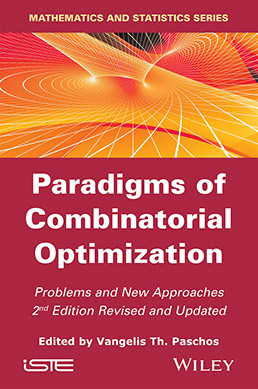
This updated and revised 2nd edition of the three-volume Combinatorial Optimization series covers a very large set of topics in this area, dealing with fundamental notions and approaches as well as several classical applications of Combinatorial Optimization.
Combinatorial Optimization is a multidisciplinary field, lying at the interface of three major scientific domains: applied mathematics, theoretical computer science, and management studies. Its focus is on finding the least-cost solution to a mathematical problem in which each solution is associated with a numerical cost. In many such problems, exhaustive search is not feasible, so the approach taken is to operate within the domain of optimization problems, in which the set of feasible solutions is discrete or can be reduced to discrete, and in which the goal is to find the best solution. Some common problems involving combinatorial optimization are the traveling salesman problem and the minimum spanning tree problem.
Combinatorial Optimization is a subset of optimization that is related to operations research, algorithm theory, and computational complexity theory. It has important applications in several fields, including artificial intelligence, mathematics, and software engineering.
This second volume, which addresses the various paradigms and approaches taken in Combinatorial Optimization, is divided into two parts:
- Paradigmatic Problems, which discusses several famous combinatorial optimization problems, such as max cut, min coloring, optimal satisfiability TSP, etc., the study of which has largely contributed to the development, the legitimization and the establishment of Combinatorial Optimization as one of the most active current scientific domains.
- New Approaches, which presents the methodological approaches that fertilize and are fertilized by Combinatorial Optimization such as polynomial approximation, on-line computation, robustness, etc., and, more recently, algorithmic game theory.
The three volumes of this series form a coherent whole. The set of books is intended to be a self-contained treatment requiring only basic understanding and knowledge of a few mathematical theories and concepts. It is intended for researchers, practitioners and MSc or PhD students.
Part 1. Paradigmatic Problems
1. Optimal Satisfiability, Cristina Bazgan.
2. Scheduling Problems, Philippe Chrétienne and Christophe Picouleau.
3. Location Problems, Aristotelis Giannakos.
4. MinMax Algorithms and Games, Michel Koskas.
5. Two-dimensional Bin Packing Problems, Andrea Lodi, Silvano Martello, Michele Monaci and Daniele Vigo.
6. The Maximum Cut Problem, Walid Ben-Ameur, Ali Ridha Mahjoub and José Neto.
7. The Traveling Salesman Problem and its Variations, Jérôme Monnot and Sophie Toulouse.
8. 0–1 Knapsack Problems, Gérard Plateau and Anass Nagih.
9. Integer Quadratic Knapsack Problems, Dominique Quadri, Eric Soutif and Pierre Tolla.
10. Graph Coloring Problems, Dominique De Werra and Daniel Kobler.
Part 2. New Approaches
11. Polynomial Approximation, Marc Demange and Vangelis Th. Paschos.
12. Approximation Preserving Reductions, Giorgio Ausiello and Vangelis Th. Paschos.
13. Inapproximability of Combinatorial Optimization Problems, Luca Trevisan.
14. Local Search: Complexity and Approximation, Eric Angel, Petros Christopoulos and Vassilis Zissimopoulos.
15. On-line Algorithms, Giorgio Ausiello and Luca Becchetti.
16. Polynomial Approximation for Multicriteria Combinatorial Optimization Problems, Eric Angel, Evripidis Bampis and Laurent Gourvès.
17. An Introduction to Inverse Combinatorial Problems, Marc Demange and Jérôme Monnot.
18. Probabilistic Combinatorial Optimization, Cècile Murat and Vangelis Th. Paschos.
19. Robust Shortest Path Problems, Virginie Gabrel and Cécile Murat.
20. Algorithmic Games, Aristotelis Giannakos and Vangelis Paschos.
21. Combinatorial Optimization with Competing Agents, Diodato Ferraioli, Laurent Gourves, Stefano Moretti, Fanny Pascual and Olivier Spanjaard.
Vangelis Th. Paschos is Professor of Computer Science at the University of Paris-Dauphine and Chairman of the LAMSADE (Laboratory for the Modeling and the Analysis of Decision Aiding Systems). His research interests include complexity theory, the theory of the polynomial approximation of NP-hard problems, probabilistic combinatorial optimization and on-line computation. He is the author of more than a 100 research papers and is a member of the editorial board of several international scientific journals.